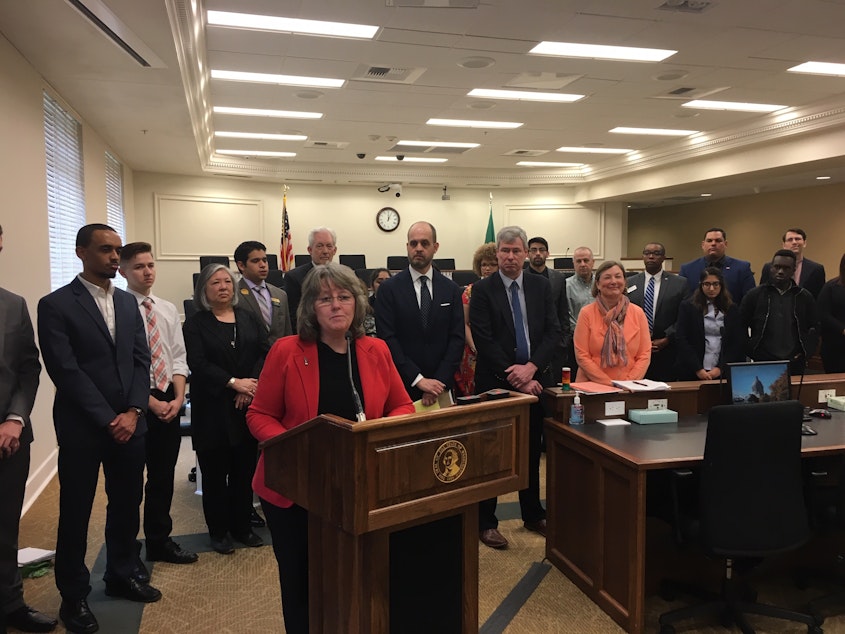Washington House Democrats propose $1.4B tax package to fund budget

Washington House Democrats on Monday unveiled a proposed $1.4 billion tax package, including a new capital gains tax, to fund a two-year budget with ongoing commitments to public schools, increased spending for people with mental illness and higher reimbursement rates for a wide-range of social service providers.
The Democrats' overall, proposed $52.6 billion budget represents a roughly $8 billion increase in state spending compared to the last budget cycle. That's less than the $10 billion increase Gov. Jay Inslee proposed in December, but like Inslee, House Democrats were quick to point out that most of their proposed additional spending — $5.8 billion — is required to maintain services at current levels and to continue to fully fund public schools under the McCleary school funding lawsuit.
The state is expected to bring in an additional $4.5 billion through the next biennium as a result of a strong economy. However, Inslee and House Democrats insist that additional revenue is not enough to fund all of the state's obligations.
"We have a lot of priority investments, we have a lot of needs, but it has become clear to all of us that we have important work to do," said House Finance Chair Gael Tarleton at a budget briefing Monday morning. "And, unfortunately, the post-Great Recession economy has not produced enough revenue to fund our current needs."
Sponsored
The breakdown
The House Democratic tax package includes a new 9.9 percent tax on capital gains above $100,000 for single filers and $200,000 for married couples, beginning in July 2020. The tax would apply to the sale of stocks and bonds, but would exempt things such as the sale of single-family homes or timber and agricultural lands.
House Democrats estimate that fewer than 14,000 households would pay the tax, which they project would raise $780 million in the next two-year budget and $1.9 billion in the following biennium.
Inslee had also proposed a capital gains tax, though his tax had a much lower threshold for money made off stocks and bonds. Under Inslee's plan, the state would tax capital gains over $25,000 for individuals and $50,000 for couples.
Like the governor, House Democrats are also proposing to replace Washington's flat 1.28 percent real estate excise tax with something they say is more progressive: For sales above $1.5 million, Democrats are proposing a higher tax rate, between 2 and 3 percent.
This, the Democrats say, would result in 98 percent of sellers paying less tax or the same tax.
Sponsored
The third leg of the House Democratic tax package is an increase from 1.5 percent to 1.8 percent in the business and occupation tax on service businesses that rely heavily on workers with post-secondary degrees, like software engineers and accountants. The tax proceeds would be dedicated to higher education, including full funding of the Washington College Grant program and more enrollment slots in high demand programs like computer science and engineering.
The likely backlash
Republicans quickly panned the tax package as unnecessary.
"We can easily write a budget that funds all of our state priorities without raising any taxes," said state Rep. Drew Stokesbary, the ranking Republican on the House Appropriations Committee.
Anticipating criticism from Republicans and the business community, House Majority Leader Pat Sullivan defended the decision to pursue new and higher taxes and reiterated that K-12 spending will eat up most of the new revenues flowing to the state as a result of the healthy economy.
Sponsored
"Don't be fooled when they say that we have $4.5 billion to spend on new things because it is absolutely not true," Sullivan said. "That money is being invested for the 1.1 million school kids across this state and we're going to live up to that promise and fund that commitment."
If Democrats ultimately impose a capital gains tax, it's likely to be challenged in court by opponents who say it's a form of an income tax.
Where the money would go
Besides education, House Democrats would make significant new investments in the state's mental health system, totaling $206 million over the next two years. That money would go to expand access to treatment in the community, improve safety at the state's psychiatric hospitals and comply with a legal settlement that requires the state address the plight of mentally ill criminal defendants languishing in jail.
Other spending priorities include increasing reimbursement rates to service providers who work with the developmentally disabled and those who need long-term care. Similarly, in the child welfare system, providers of Behavioral Rehabilitation Services would get an increase in their rates to care for the most at-risk foster youth.
Sponsored
Homelessness and housing services, addressing a backlog of untested rape kits at the state crime lab and prepaid postage for elections are also included in the proposed House budget, along with $11 million for orca recovery.
The House Democratic budget would also dedicate an additional $70 million to special education, which is underfunded in Washington, and spend $5 million to improve student mental health and safety.
Inslee's budget has long been viewed as the high-water mark in spending. House Democrats acknowledged Monday that they propose to spend less than the governor in "almost every functional area," including education, behavioral health and the environment.
"This is that balance between wants and needs and we focused more on the needs and not the wants and the governor only has to get one vote for his budget," Sullivan said.
House Democrats plan to pass their budget, but not the accompanying tax package, off the floor of the House this Friday. Meanwhile Senate Democrats are expected to unveil their budget proposal later this week. The two chambers have until April 28, the last day of the 105-day legislative session, to negotiate and pass a final budget.
[Copyright 2019 Northwest News Network]

